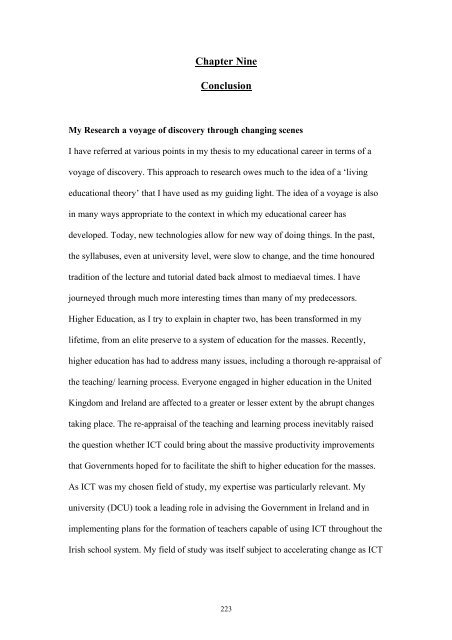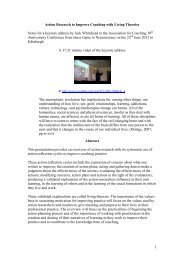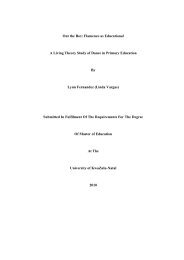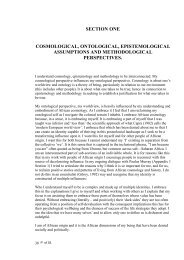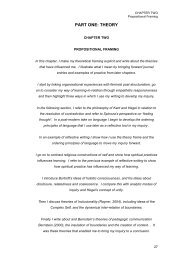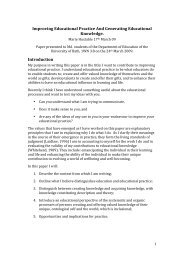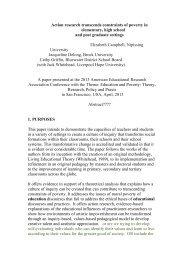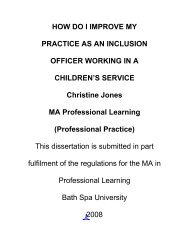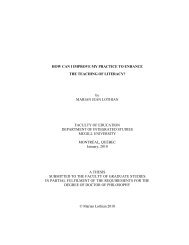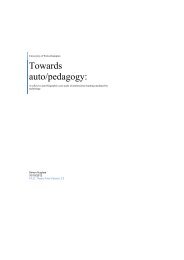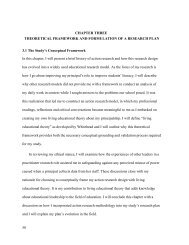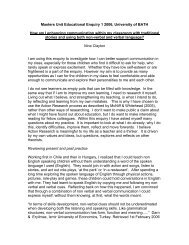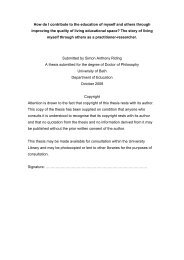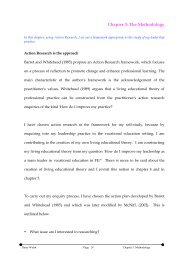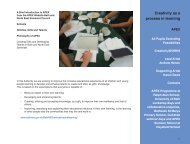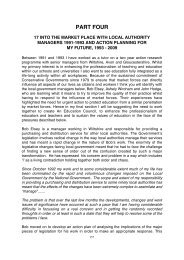Chapter Nine Conclusion - Action Research @ actionresearch.net
Chapter Nine Conclusion - Action Research @ actionresearch.net
Chapter Nine Conclusion - Action Research @ actionresearch.net
Create successful ePaper yourself
Turn your PDF publications into a flip-book with our unique Google optimized e-Paper software.
<strong>Chapter</strong> <strong>Nine</strong><br />
<strong>Conclusion</strong><br />
My <strong>Research</strong> a voyage of discovery through changing scenes<br />
I have referred at various points in my thesis to my educational career in terms of a<br />
voyage of discovery. This approach to research owes much to the idea of a ‘living<br />
educational theory’ that I have used as my guiding light. The idea of a voyage is also<br />
in many ways appropriate to the context in which my educational career has<br />
developed. Today, new technologies allow for new way of doing things. In the past,<br />
the syllabuses, even at university level, were slow to change, and the time honoured<br />
tradition of the lecture and tutorial dated back almost to mediaeval times. I have<br />
journeyed through much more interesting times than many of my predecessors.<br />
Higher Education, as I try to explain in chapter two, has been transformed in my<br />
lifetime, from an elite preserve to a system of education for the masses. Recently,<br />
higher education has had to address many issues, including a thorough re-appraisal of<br />
the teaching/ learning process. Everyone engaged in higher education in the United<br />
Kingdom and Ireland are affected to a greater or lesser extent by the abrupt changes<br />
taking place. The re-appraisal of the teaching and learning process inevitably raised<br />
the question whether ICT could bring about the massive productivity improvements<br />
that Governments hoped for to facilitate the shift to higher education for the masses.<br />
As ICT was my chosen field of study, my expertise was particularly relevant. My<br />
university (DCU) took a leading role in advising the Government in Ireland and in<br />
implementing plans for the formation of teachers capable of using ICT throughout the<br />
Irish school system. My field of study was itself subject to accelerating change as ICT<br />
223
offered an increasing range of flexible communication systems. That added a further<br />
set of rapidly passing milestones along the eventful path that I was navigating.<br />
ICT in the context of teaching and learning debates<br />
Having undertaken Masters’ research in 1990 in the University of Bath where some<br />
very radical ideas were being discussed around about the direction that educational<br />
research should take and the relationship between research and teaching, I was well<br />
equipped to appreciate the debate that began to develop in academia around teaching<br />
and learning in higher education. When I graduated the expansion of universities in<br />
the United Kingdom was just beginning – in the Republic of Ireland, it still lay in the<br />
future. It is difficult to realise it now but that was also a time when the inter<strong>net</strong><br />
scarcely existed as a means of global communication. I have lived through the<br />
debates on university pedagogy. I have been endlessly up-dating my knowledge and<br />
skills in ICT. As the director of a postgraduate programme in ICT in education and<br />
training, I have the advantage of having perspectives upon both these developments.<br />
My experience in either direction, informed by the increasing flow of literature about<br />
practice-based research, has enabled me to secure a fuller understanding of the<br />
continuingly crucial role of the teacher and the importance of teacher/student<br />
collaboration in the learning process. It has also enabled me to see that ICT, far from<br />
displacing the teacher, opens up new creative possibilities for participants provided<br />
that they see learning as a collaborative process not only involving teacher/student<br />
dialogue but with a wider dimension of student/student dialogue moving toward a<br />
‘web of betweenness’ that ICT can facilitate (Appendix D, E, F).<br />
224
Theory and practice<br />
All this leads to a conviction of the need for more practice-based research. I have been<br />
greatly helped by the fact that this is the way that much research in the educational<br />
field has been moving. I have been able to cite a series of authors that have made this<br />
their chief preoccupation. They offer methodologies, including, among others, action<br />
research, that have both helped me in framing my own research study and provided<br />
criteria that enable me to work out the form of rigour and validity that would be most<br />
relevant to the research studies in which I have been engaged. Above all they have<br />
shown me how the development of teaching can yield results that hopefully may help<br />
others along similar paths, as I have been assisted in my own journey by what I have<br />
learned of the experiences of others.<br />
Practicing values<br />
<strong>Chapter</strong> Six and Seven explore my work in the context of the M.Sc. in Computer<br />
Applications for Education, and how I have endeavoured to improve my practice by<br />
recognising myself as a ‘living contradiction’, in the sense of holding values and<br />
negating these values in practice. I endeavour to involve and support participants in<br />
creating their knowledge from the ground of their own practice.<br />
Web of betweenness<br />
I show the processes that are involved in my supervision, as my value of ‘web of<br />
betweenness’ emerged and was enacted in practice. I explained how this relationship<br />
evolved beginning with a one to one basis as I tried to support a teacher in developing<br />
his capacity to accept responsibility for improving his practice. Subsequently I<br />
transformed this learning experience into a collaborative process when I involved him<br />
225
in validation group meetings that were intended to help him to develop his learning in<br />
a peer group context. I also engaged him in developing his understandings through<br />
dialoguing with other researchers and academics.<br />
Pedagogy of the unique<br />
<strong>Chapter</strong> Eight shows how I have successfully achieved my goal of developing the<br />
capacity of participants to be proactive in developing their knowledge. In the context<br />
of my ‘pedagogy of the unique’ these dialogic processes reflect my growing openness<br />
to the notion of learning and relearning with others, and reveal that I believe that<br />
education should be a democratic process that gives adequate “space to each<br />
participant to contribute to the development of new knowledge, to develop their own<br />
voice, to make their own offerings, insights, to engage in their own actions, as well as<br />
to create their own products” (Bar<strong>net</strong>t, 2000). I believe that I have directed my<br />
teaching towards learning by gradually providing opportunities for participants to take<br />
responsibility for their own learning and develop their capacity as learners.<br />
Educational values<br />
As I mentioned above, at a particular stage in my teaching career, I have recognised<br />
that in a certain sense I represented myself as a ‘living contradiction’ i.e. holding<br />
educational values and denying them in my practice. Through the action research<br />
process of experiencing myself as a ‘living contradiction’ I have been able to imagine<br />
a way forward in order to live my educational values more fully in practice. I hope<br />
that I can justifiably claim to have created my ‘pedagogy of the unique’ through my<br />
ontological commitment to a ‘web of betweenness’. By this I see learning as<br />
relational and ICT as a way of bringing us closer to the meanings of our embodied<br />
226
knowledge. My values as they have emerged in the course of my practice may be<br />
clarified as follows:<br />
1. Learning as relational<br />
I believe that learning is relational i.e. we learn in relation to one other. I try to foster<br />
and create a collaborative learning environment. In my experience, learning requires<br />
the qualities of openness, sharing and trust. In my work with participants, I have tried<br />
to articulate my own educational values. This was not easy to do at the start but I<br />
realised that in order to enable participants to articulate their educational values, I<br />
needed to openly share my values with them. Trust is an important quality in creating<br />
and sustaining a collaborative learning environment. I have endeavoured to trust my<br />
own embodied knowledge by enquiring into my practice in order to bring about<br />
improvement. It would have sometimes been easier to fall back upon didactic<br />
methods. I have constantly endeavoured to maintain my trust that each participant<br />
would learn in turn to trust their own embodied knowledge as they develop their<br />
practice.<br />
2. Creating narratives of our own learning<br />
I value each participant’s creativity, enquiring mind and critical judgement. I believe<br />
that it is vital to listen to the needs of participants and to build a curriculum in<br />
collaboration with them. Participants come from various contexts and I try to support<br />
each participant from where they are starting from in their learning. It is important to<br />
provide space for each of the participants to articulate their concerns and ideas as they<br />
develop their practice. I have endeavoured to support practice-based research since<br />
the start of my work in higher education. This has involved risk as I was bringing a<br />
227
new form of scholarship into the academy. I had to justify the methodology and<br />
ensure that the research was carried out in a valid and rigorous fashion.<br />
3. Developing a dialogic education<br />
I believe that dialogue is fundamental to the teaching and learning process and that<br />
each participant has a unique contribution to make to a knowledge base of practice.<br />
I have sought to highlight how participants have been collaborators in this educational<br />
journey, not subjects to be studied. I am conscious of the need for participants to have<br />
the space to develop their own voice. I try to provide this space, both in the classroom<br />
and online, where people can create knowledge in collaboration with one another. I<br />
have endeavoured to involve participants in dialogue with myself, one another and<br />
others. I have tried to support dialogue through face-to-face class sessions, validation<br />
meetings, and through the use of a collaborative online learning environment.<br />
Through dialogue and trying to understand other points of view – different criteria - I<br />
was able to ensure that the participant narratives were legitimated by the academy for<br />
the DCU M.Sc. degree.<br />
4. Communicating teaching as a scholarly activity<br />
I believe that practice-based research is a form of scholarly research. In the course of<br />
my doctoral research, I have reviewed a number of national and international reports<br />
concerned with teaching and learning in higher education. I have paid close attention<br />
in my research to the various forms of pedagogy in higher education in order to secure<br />
a better understanding of the relevant literature. This has enabled me to appreciate the<br />
strongly innovative thrust of much of the emerging scholarship dealing with teaching<br />
and learning in higher education. I have presented my practice-based research at<br />
228
national and international conferences. I have also made presentations at conferences<br />
with participants on the Masters programmes. In each instance, I have benefited from<br />
the discussions that my papers have generated [WWW4] [DVD1].<br />
5. Using ICT in a creative way<br />
My teaching practice and my research enquiry have been founded on the belief that<br />
ICT can be used in a creative way. Participants on DCU postgraduate programmes<br />
come from various contexts and I try to support them towards the development of<br />
multimedia and web based artefacts for use in their own practice as a substitute for<br />
ready made software. I try to keep up-to-date with new developments in technology.<br />
On three occasions I have successfully applied for funding from the DCU Teaching<br />
and Learning Awards body. These have enabled me to introduce new and emerging<br />
technologies into the M.Sc. programmes thereby providing a broader curriculum for<br />
participants. I try to involve representatives from industry, education and research in<br />
order to develop the programme and its reputation.<br />
Summary<br />
In creating my ‘pedagogy of the unique’, I have shown the risks and challenges<br />
involved in bringing a new form of research and knowledge into the academy.<br />
My practice-based research enquiry has indeed been a collaborative endeavour that<br />
could not have taken place were it not for the participation of students in the creation<br />
of knowledge in collaboration with me. I have articulated the educational values that<br />
have emerged in my practice and I believe that I have endeavoured faithfully to live<br />
these values in my practice. My values can now be seen to be communicable<br />
standards of judgement with regard to my doctoral research enquiry. I hope that my<br />
229
enquiry will contribute to new understandings of the link between teaching and<br />
research and how teachers can contribute a knowledge base of practice through use of<br />
ICT [WWW9] [DVD1].<br />
To be a ‘higher education’ in the Bar<strong>net</strong>t sense, I believe that the curriculum can be a<br />
co-creation between participants and lecturers as we engage with the wider<br />
curriculum. This has involved listening to the points of view of participants,<br />
understanding their particular concerns and context. I hope that I can justifiably claim<br />
to have created my ‘pedagogy of the unique’ through my ontological commitment to a<br />
‘web of betweenness’. By this I see learning as relational and ICT as a way of<br />
bringing us closer to the meanings of our embodied values.<br />
230


